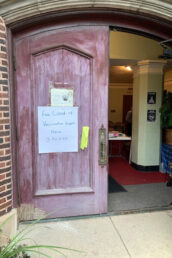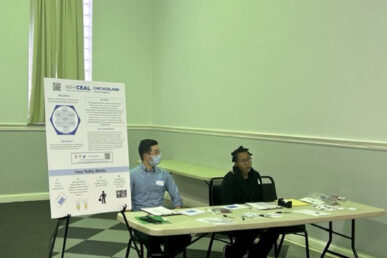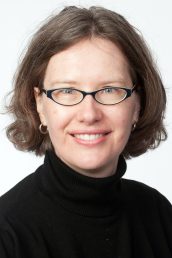How a research team moved from tackling vaccine hesitancy to addressing broader issues of mistrust
It’s been two years since a Chicago-area collaborative, led by the University of Illinois Chicago, started studying how to boost COVID-19 vaccine uptake among Chicago’s Black and Latino residents through community partnerships. In that time, the team has broadened its focus well beyond advocating for a specific vaccination and is looking at the roots of mistrust of the medical establishment in these communities, with the goal of building and strengthening relationships to improve people’s overall health.
En español
“This is definitely evolving beyond COVID,” explained Dr. Molly Martin, professor of pediatrics and associate head of research in the College of Medicine.
As part of the NIH’s Community Engagement Research Alliance Against COVID-19 Disparities, the Chicagoland CEAL Program recently received $1.26 million in funding for its third year. The group also has recently published three research papers about their work so far.
When the NIH-funded CEAL teams across the country in 2021, the goal was to have them immediately get to work vaccinating marginalized populations who were disproportionately infected and hospitalized with COVID-19 but who weren’t getting vaccinated as quickly as other groups.
The Chicagoland CEAL researchers did something different. They knew that the existing public health infrastructure in the Chicago area was offering many opportunities and support for vaccination. This meant that access wasn’t the main issue. They set out to explore the true causes of that vaccine hesitancy.
“NIH said, ‘Here’s your money. Go, go go!’” Martin says of that first round of funding. “We said, ‘No, we’re going to take a minute and talk to people and make sure that what we do matches what they need and want.’”
The need for trusted messengers
The researchers conducted a rapid needs assessment of 34 community organizations to identify the resources and gaps in the area’s vaccination programs, the results of which are published in Frontiers in Public Health.
Nearly 90% of the community organizations surveyed strongly advocated using “trusted messengers” from within the community to overcome vaccine concerns as opposed to sending in unknown medical professionals. Nearly half of the organizations said there was a need to train community health workers to provide this sort of service. The community organizations also encouraged methods such as offering social services or financial incentives to draw people to vaccination events.
All of these initiatives require additional resources, from money to logistics. After conducting this needs assessment, the Chicagoland CEAL team starting thinking of ways they could provide some of these resources.
For example, researchers often heard that community organizations needed help evaluating the success of their programs. “They really wanted to be collecting and analyzing the vaccination data from all their events,” Martin said. “But they just didn’t have enough infrastructure to be as effective in that as they wanted to be.”

So the Chicagoland CEAL Program conducted evaluations of 269 vaccination events between May 2021 and April 2022 in partnership with the community organizations hosting the events. The results of this project are published in the Journal of Community Health.
They found that the most successful strategies included holding vaccination events in familiar community settings, combining vaccinations with social services and giving community organizations the flexibility to adjust their programs as they saw fit.
Increasing trustworthiness
Overall, these two studies showed how community organizations could help overcome decades of mistrust of the medical system in these communities.
“We heard a lot of frustration and concerns around the rapid deployment of resources for vaccination, while basic social service needs were being ignored and had been ignored for a really long time,” Martin said. “We heard from people who said, ‘You know, you haven’t had a presence here forever, even though we’ve been asking for it, and now all of a sudden, you’re all over and say you care about us. Why should we trust what you’re bringing us?’”
The group’s third paper addresses these larger systemic issues. It argues that it’s crucial for health care organizations to focus on becoming trustworthy, as opposed to laying the onus on community members to let go of their mistrust, given how years of systemic racism have rightly bred that mistrust. This perspectives piece is published in Health Equity.
A lot of the conversation around vaccine hesitancy in Black and Latino communities has focused on the idea that they’re consuming misinformation, which implies ignorance of the science.
“People were saying that if we fix the misinformation, they’ll get the vaccine,” Martin said. “But it’s not misinformation. Their information is exactly accurate and appropriate for their lived experience. It comes from a lot of history. What we’re trying to do is build the trustworthiness of the research enterprise — the NIH, the other institutions involved — so that people start to trust that the research actually reflects them and includes them.”

The new round of funding will allow the Chicagoland CEAL Program to continue its work, including helping community organizations network among themselves so they can help one another, as well as to develop connections between the organizations and Chicago’s large health care institutions.
The group also helps community organizations build their own research capacity. Some groups need training to do their own evaluations; some need partners to conduct evaluations. Some want training so they can become more involved in research done by larger institutions who are studying their communities — for example, learning how to advocate for the inclusion of research questions important to the community or gaining skills in how to apply research results to their own work. The lessons from the past two years are also being extended to diseases and conditions well beyond COVID-19, such as hypertension and the flu vaccine.
The Chicagoland COVID Collaborative includes co-principal investigators from Loyola University Chicago, Equal Hope, Northwestern University, Rush University Medical Center, Sinai Urban Health Institue, and the University of Chicago.

